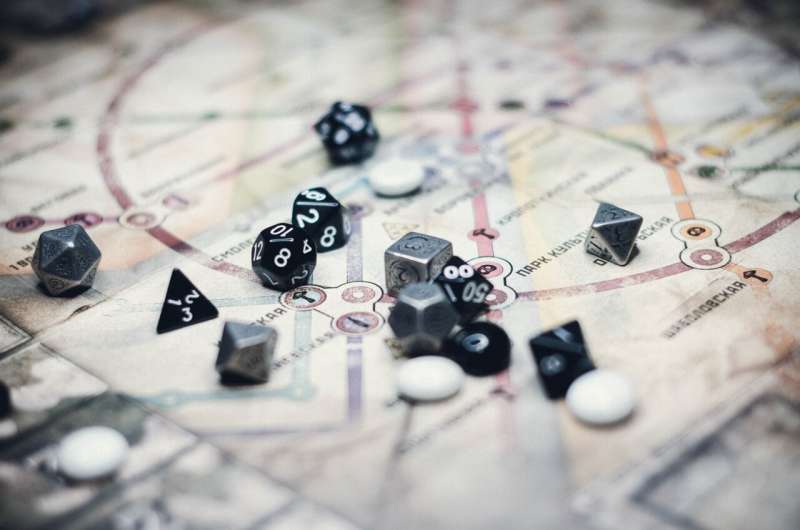This article has been reviewed according to Science X's editorial process and policies. Editors have highlighted the following attributes while ensuring the content's credibility:
fact-checked
trusted source
proofread
Board games boost math ability in young children, study finds

Board games based on numbers, like Monopoly, Othello and Chutes and Ladders, make young children better at math, according to a comprehensive review of research published on the topic over the last 23 years.
Board games are already known to enhance learning and development including reading and literacy.
Now this new study, published in the journal Early Years, finds, for 3- to 9-year-olds, the format of number-based board games helps to improve counting, addition, and the ability to recognize if a number is higher or lower than another.
The researchers say children benefit from programs—or interventions—where they play board games a few times a week supervised by a teacher or another trained adult.
"Board games enhance mathematical abilities for young children," says lead author Dr. Jaime Balladares, from Pontificia Universidad Católica de Chile, in Santiago, Chile.
"Using board games can be considered a strategy with potential effects on basic and complex math skills.
"Board games can easily be adapted to include learning objectives related to mathematical skills or other domains."
Games where players take turns to move pieces around a board differ from those involving specific skills or gambling.
Board game rules are fixed which limits a player's activities, and the moves on the board usually determine the overall playing situation.
However, preschools rarely use board games. This study aimed to compile the available evidence of their effects on children.
The researchers set out to investigate the scale of the effects of physical board games in promoting learning in young children.
They based their findings on a review of 19 studies published from 2000 onwards involving children aged from 3 to 9 years. All except one study focused on the relationship between board games and mathematical skills.
All children participating in the studies received special board game sessions which took place on average twice a week for 20 minutes over one-and-a-half months. Teachers, therapists, or parents were among the adults who led these sessions.
In some of the 19 studies, children were grouped into either the number board game or to a board game that did not focus on numeracy skills. In others, all children participated in number board games but were allocated different types (e.g., Dominoes).
All children were assessed on their math performance before and after the intervention sessions which were designed to encourage skills such as counting out loud.
The authors rated success according to four categories including basic numeric competency such as the ability to name numbers, and basic number comprehension (e.g., 'nine is greater than three').
The other categories were deepened number comprehension—where a child can accurately add and subtract—and interest in mathematics.
In some cases, parents attended a training session to learn arithmetic that they could then use in the games.
Results showed that math skills improved significantly after the sessions among children for more than half (52%) of the tasks analyzed.
In nearly a third (32%) of cases, children in the intervention groups gained better results than those who did not take part in the board game intervention.
The results also show that from analyzed studies to date, board games on the language or literacy areas, while implemented, did not include scientific evaluation (i.e. comparing control with intervention groups, or pre and post-intervention) to evaluate their impact on children.
Designing and implementing board games along with scientific procedures to evaluate their efficacy, therefore, are "urgent tasks to develop in the next few years," Dr. Balladares, who was previously at UCL, argues.
And this, now, is the next project they are investigating.
Dr. Balladares concludes, "Future studies should be designed to explore the effects that these games could have on other cognitive and developmental skills.
"An interesting space for the development of intervention and assessment of board games should open up in the next few years, given the complexity of games and the need to design more and better games for educational purposes."
More information: The effects of board games on math skills in children attending prekindergarten and kindergarten: A systematic review, Early Years, DOI: 10.1080/09575146.2023.2218598 , www.tandfonline.com/doi/full/1 … 9575146.2023.2218598
Provided by Taylor & Francis





















